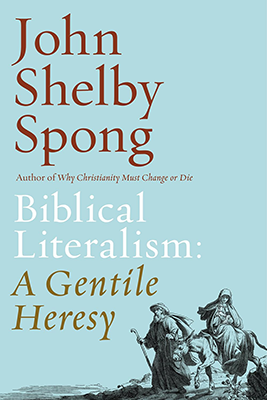Biblical Literalism
“Biblical Literalism: A Gentile Heresy” is a book by John Shelby Spong, a retired American bishop of the Episcopal Church and a prominent liberal theologian. Published in 2016, the book challenges the concept of biblical literalism and its impact on Christian theology and interpretation. Here’s a summary:
Main Themes:
Critique of Literalism: Spong critiques the literalist approach to interpreting the Bible, arguing that it leads to narrow, rigid, and dogmatic interpretations that ignore the complexity and diversity of biblical texts. He suggests that literalism stifles critical thinking, inhibits intellectual growth, and promotes intolerance and divisiveness within religious communities.
Historical and Cultural Context: Spong emphasizes the importance of understanding the historical and cultural context of biblical texts, including their origins, authorship, and literary genres. He argues that literalist readings often overlook the nuances and complexities of ancient Hebrew and Christian literature, leading to misinterpretations and distortions of meaning.
Metaphor and Symbolism: Drawing from his background in biblical scholarship and theology, Spong explores the metaphorical and symbolic dimensions of biblical language. He suggests that many biblical narratives, such as creation stories and miracle accounts, are best understood as metaphorical expressions of deeper spiritual truths, rather than literal descriptions of historical events.
Interfaith Dialogue: Spong advocates for a more open and inclusive approach to religious belief and interpretation, one that engages with insights from other faith traditions, as well as secular philosophy and science. He encourages readers to embrace uncertainty, ambiguity, and mystery in their quest for spiritual understanding.
Key Concepts:
– Evolution of Belief: Spong traces the historical development of biblical literalism within Christianity, exploring how it emerged as a response to modernity and challenges to traditional religious authority. He suggests that literalism reflects a fear of change and a desire for certainty in the face of uncertainty.
– Ethical Imperatives: Spong highlights the ethical imperatives embedded within biblical teachings, including the call to love one another, seek justice, and care for the marginalized and oppressed. He argues that these ethical principles transcend literalist interpretations of scripture and provide a foundation for a more compassionate and inclusive faith.
– Theological Reinterpretation: Throughout the book, Spong offers alternative interpretations of key biblical passages, challenging literalist readings and offering new insights into familiar texts. He encourages readers to engage critically with scripture, asking questions and seeking deeper meanings beyond literal surface readings.
Legacy:
“Biblical Literalism: A Gentile Heresy” has sparked debate and discussion within both religious and scholarly circles. Spong’s critique of literalism offers a fresh perspective on familiar biblical texts and challenges readers to rethink their approach to interpretation and faith. While controversial, the book has contributed to ongoing conversations about the nature of scripture, the evolution of Christian theology, and the relationship between faith and reason.

